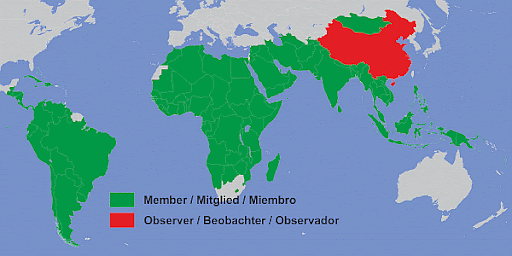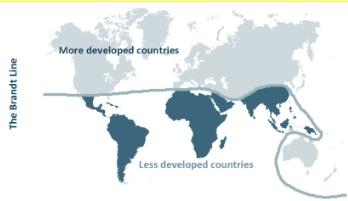International Relations
Third South Summit
- 29 Jan 2024
- 10 min read
For Prelims: Group of 77 (G77) and China, South-South cooperation, United Nations Conference on Trade and Development (UNCTAD), 2030 Agenda for Sustainable Development.
For Mains: Third South Summit, Bilateral, regional and global groupings and agreements involving India and/or affecting India’s interests.
Why in News?
Recently, the 3rd South Summit was held in Kampala, Uganda, bringing together the members of the Group of 77 (G77) and China.
- The Third South Summit brought together the 134 members of the Group of 77 and China to boost South-South cooperation on trade, investment, sustainable development, climate change, poverty eradication, and digital economy, among other areas. The theme of the summit was “Leaving No One Behind.”
What is Group of 77 (G77)?
- Establishment:
- The Group of 77 (G-77) was established on 15th June 1964 by signatories of the “Joint Declaration of the Seventy-Seven Developing Countries” issued at the end of the first session of the United Nations Conference on Trade and Development (UNCTAD) in Geneva.
- The G77 group has 134 members excluding China because the Chinese government does not consider itself a member, but rather a partner that provides political and financial support to the group. Although the group (G 77) mentiones China as its member.
- The Group of 77 (G-77) was established on 15th June 1964 by signatories of the “Joint Declaration of the Seventy-Seven Developing Countries” issued at the end of the first session of the United Nations Conference on Trade and Development (UNCTAD) in Geneva.
- Aims:
- The Group of 77 is the largest intergovernmental organization of developing countries in the United Nations.
- It provides the means for the countries of the South to articulate and promote their collective economic interests and enhance their joint negotiating capacity on all major international economic issues within the United Nations system.
- Structure:
- A Chairman, who acts as its spokesman, coordinates the Group’s action in each Chapter.
- The Chairmanship, which is the highest political body within the organizational structure of the Group of 77, rotates on a regional basis (between Africa, Asia-Pacific, Latin America and the Caribbean) and is held for one year in all the Chapters.
- Chapters refer to the regional divisions, currently, Uganda is the chairman, acts as the spokesperson and coordinates the actions of the G-77 on behalf of the member countries within the African Chapter.
- Chapters in G77 are the offices of the group in different locations where they coordinate their activities and represent their interests in various UN agencies and international forums.
- The chapters of the G77 are in Geneva (UN), Rome (FAO), Vienna (UNIDO), Paris (UNESCO), Nairobi (UNEP) and the Group of 24 in Washington, D.C. (IMF and World Bank).
- Chapters refer to the regional divisions, currently, Uganda is the chairman, acts as the spokesperson and coordinates the actions of the G-77 on behalf of the member countries within the African Chapter.
- For the year 2024, the Republic of Uganda holds the Chairmanship of the G-77.
- South Summit:
- The South Summit is the supreme decision-making body of the Group of 77.
- The First and the Second South Summits were held in Havana, Cuba, in 2000 and in Doha, Qatar, in 2005, respectively.
What are the Key Highlights of the Third South Summit Outcome Document?
- Call for Peaceful Solution of Palestinian-Israeli conflict:
- Member countries emphasised that “there can be no sustainable development without peace and no peace without sustainable development” and called for a “just and peaceful solution of the Palestinian-Israeli conflict.”
- Universal Implementation of Agendas:
- The Outcome Document reaffirmed the commitment to implementing various global agendas, including the 2030 Agenda for Sustainable Development, the Addis Ababa Action Agenda (AAAA), the Paris Agreement on climate change, the New Urban Agenda (NUA), and the Sendai Framework for Disaster Risk Reduction (DRR).
- Poverty Eradication:
- Member countries reaffirmed poverty eradication as the greatest global challenge and an indispensable requirement for sustainable development.
- Stressing the importance of adequate means of implementation, leaders called upon developed countries to commit to a new phase of international cooperation through a strengthened and scaled-up global partnership for development.
- Strengthening Multilateral Institutions:
- The summit stressed the need to strengthen the role of the UN General Assembly (UNGA) and the Economic and Social Council (ECOSOC) in dealing with the reform of the international financial architecture.
- It was highlighted that the Global Financial System failed to provide a global safety net for developing countries. Deep reforms were proposed, including an SDG Stimulus of USD 500 billion annually, adequate capitalization of MDBs, and expansion of contingency financing for countries in need.
- Called for meaningful contributions to climate finance, including the delivery of USD 100 billion per year and the doubling of adaptation finance by 2025, encouraging an ambitious new finance goal at the 2024 UN Climate Change Conference (UNFCCC COP 29).
- Financing Needs and Debt Solutions:
- Member countries urged Multilateral Development Banks (MDBs) to meet the financing needs of all developing countries, including Low- and Middle-Income Countries, through concessional finance and grants.
- The leaders called for scaling up debt swaps for the Sustainable Development Goals (SDGs), including swaps for Climate and nature.
- Urgent Reforms for Inclusion and Equity:
- Leaders at the summit called for urgent reforms in multilateral organisations to recognize and leverage the significance of the Global South, emphasising the need for an international financial system rooted in inclusion and equity.
What is Global South?
- About:
- The Global South, often misconceived as a purely geographical concept, encompasses diverse countries, drawing upon geopolitical, historical, and developmental factors.
- While it is not solely defined by location, it broadly represents nations facing developmental challenges.
- Many countries included in the Global South are in the northern hemisphere, such as India, China and all of those in the northern half of Africa.
- Whereas, Australia and New Zealand, both in the southern hemisphere, are not in the Global South.
- The Global South, often misconceived as a purely geographical concept, encompasses diverse countries, drawing upon geopolitical, historical, and developmental factors.
- Historical Context:
- Brandt Line: The line was proposed by former German Chancellor Willy Brandt in the 1980s as a visual depiction of the north-south divide based upon per-capita GDP.
- This line symbolizes the global economic divide, zigzagging across continents, encompassing parts of Africa, the Middle East, India, and China, excluding Australia and New Zealand.
- Brandt Line: The line was proposed by former German Chancellor Willy Brandt in the 1980s as a visual depiction of the north-south divide based upon per-capita GDP.
- G-77: In 1964, the Group of 77 (G-77) countries came into existence when they signed a Joint Declaration during the first session of the UN Conference on Trade and Development (UNCTAD) in Geneva.
- The G-77 is a coalition of developing nations, primarily from the global south, formed to collectively address economic and development issues at the United Nations.
- Resurgence of Global South:
- Economic Dynamics:
- Economic Imbalances Exposed by Covid-19: The pandemic amplified existing economic disparities, disproportionately impacting Global South countries due to limited healthcare infrastructure, disrupted supply chains, and heavy reliance on sectors vulnerable to lockdowns.
- Shifts in Trade and Supply Chains: Reevaluations of global supply chains post-pandemic and in context of recent geopolitical conflicts like Russia-Ukraine war, opened discussions on repositioning production centers, providing an opportunity for some Global South economies to restructure and enhance their roles.
- Geopolitical Realities:
- The Global South's collective voice gained traction in international forums like G20, altering power dynamics and prompting greater consideration of their perspectives and interests.
- Environmental and Climate Impact:
- Vulnerability to Climate Change: The Global South is disproportionately affected by climate change, driving discussions on climate adaptation, resilience-building, and the need for equitable global climate action.
- Renewable Energy and Sustainable Development: Emphasis on sustainable development goals, renewable energy investments, and environmental conservation initiatives within the Global South attracted global attention and support.
- Economic Dynamics:
UPSC Civil Services Examination, Previous Year Questions (PYQs)
Prelims:
Q. In which one of the following groups are all the four countries members of G20? (2020)
(a) Argentina, Mexico, South Africa and Turkey
(b) Australia, Canada, Malaysia and New Zealand
(c) Brazil, Iran, Saudi Arabia and Vietnam
(d) Indonesia, Japan, Singapore and South Korea
Ans: (a)
Mains:
Q. ‘The long-sustained image of India as a leader of the oppressed and marginalised nations has disappeared on account of its new found role in the emerging global order.’ Elaborate. (2019)






